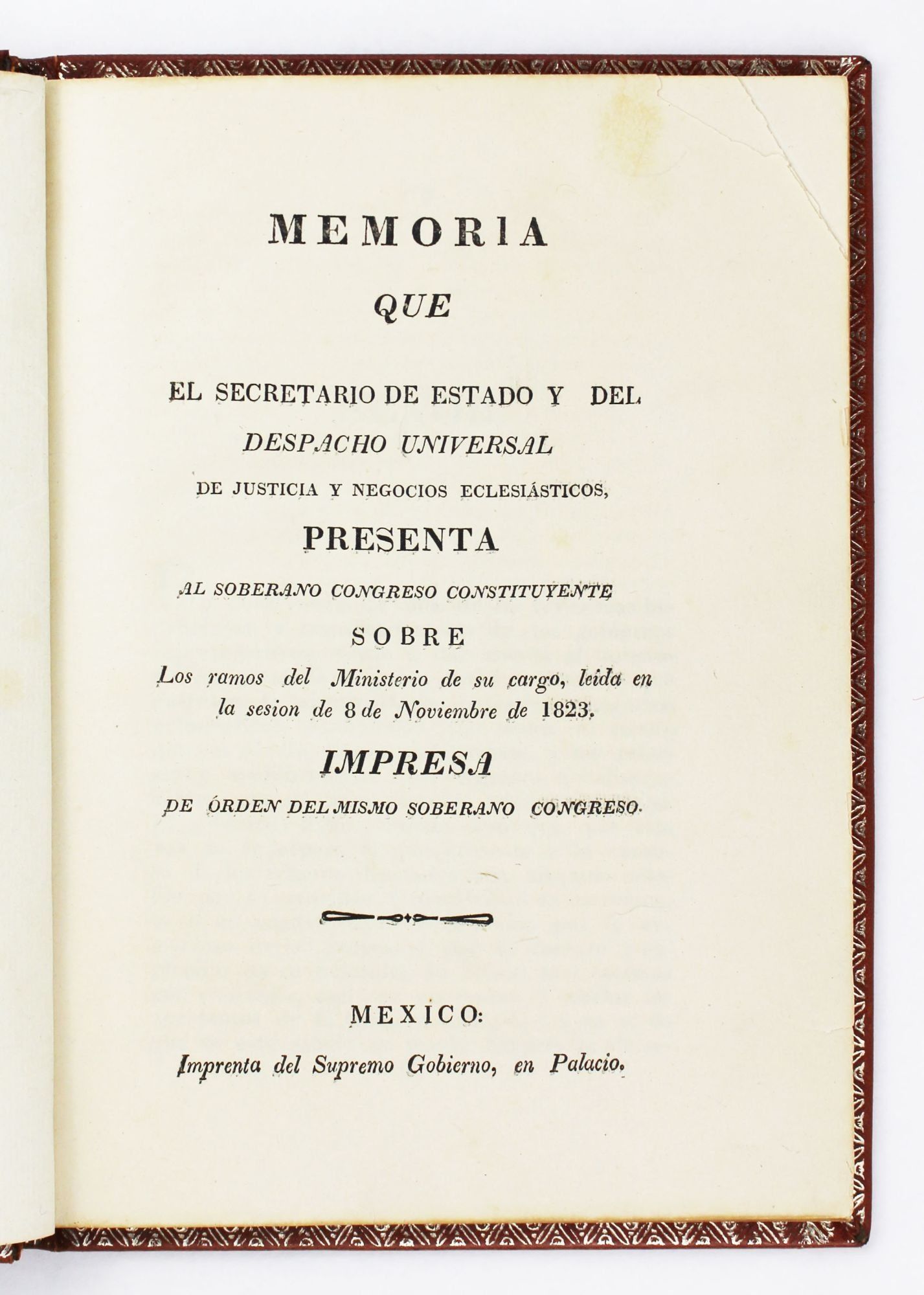Memoria Que el Secretario de Estado y del Despacho Universal de Justicia y Negocios Eclesiasticos..
- SIGNED
- Mexico City , 1823
Mexico City, 1823. Good.. 24pp., plus seven leaves of tables (one folding). Small quarto. Modern, gilt morocco. Minor wear to edges and spine ends. Loss in the upper right corner of the title page and first text leaf, not affecting text, and a few scattered, short closed tears. Moderate, even tanning; slightly brittle. This scarce report provides an overview of judicial offices and ecclesiastical posts in the chaotic early years of Mexican independence, just after the reign of Iturbide and the First Mexican Empire. Regarding the situation of the administration of religion in the country, there is an interesting reference to Texas, New Mexico and California:
"As regards the proper and immediate administration of religious officials, the picture is not, nor can it be, very flattering: bishoprics of immense extension, scattered population, three-quarters of the benefits destroyed, very few houses of ecclesiastical education, and those established in the center of our great mountain range, here are data and antecedents that cannot give favorable results; In order to neutralize them for now, and so that in the future the ecclesiastical administration remains in all its action and plenitude, it is extremely urgent in the concept of the government, to divide and even subdivide the bishoprics, multiplying, so to speak, these centers of illustration and life, from which very sensible improvements would result even in the political order and civilization, and if this is too executive in the exterior provinces, with how much more reason will it not be so in the interior ones like Texas, New Mexico, and California, which to the reasons already mentioned add that of the isolation of their populations, and the very particular and notable one of being our border?"
The document continues on to discuss the problems regarding this issue and how to solve them. For example, concerning the vices and idleness of priests, the author recommends that parishes teach mathematics, agriculture, and history:
"For the majority of the parishes where the seminarians have to go to administer, this provision seems convenient and most appropriate. Forced in effect to reside in small towns, without contact, perhaps without knowing the language, completely isolated for the same reason, without encouragement to the studies of their profession, which are generally arid, the result is boredom and idleness, and with this, the vices that enervate all faculties and scandalize the parishioners. Let us suppose, on the contrary, that they are imbued with agricultural theories and fond of the study of nature, so pleasant and delightful in itself, they would then be in a position to pleasantly fill all their time, dividing it between the functions of the sacred ministry and other occupations as useful as they are enjoyable, with which they would gain the sciences, rural practices, and innocence of customs, thereby increasing the credit, consideration, and respect of the ecclesiastical state.”
An unusually honest assessment of church offices in rural Mexico, with particular reference to far-flung regions like Texas and California. OCLC locates a small handful of copies.
Palau 160806.
"As regards the proper and immediate administration of religious officials, the picture is not, nor can it be, very flattering: bishoprics of immense extension, scattered population, three-quarters of the benefits destroyed, very few houses of ecclesiastical education, and those established in the center of our great mountain range, here are data and antecedents that cannot give favorable results; In order to neutralize them for now, and so that in the future the ecclesiastical administration remains in all its action and plenitude, it is extremely urgent in the concept of the government, to divide and even subdivide the bishoprics, multiplying, so to speak, these centers of illustration and life, from which very sensible improvements would result even in the political order and civilization, and if this is too executive in the exterior provinces, with how much more reason will it not be so in the interior ones like Texas, New Mexico, and California, which to the reasons already mentioned add that of the isolation of their populations, and the very particular and notable one of being our border?"
The document continues on to discuss the problems regarding this issue and how to solve them. For example, concerning the vices and idleness of priests, the author recommends that parishes teach mathematics, agriculture, and history:
"For the majority of the parishes where the seminarians have to go to administer, this provision seems convenient and most appropriate. Forced in effect to reside in small towns, without contact, perhaps without knowing the language, completely isolated for the same reason, without encouragement to the studies of their profession, which are generally arid, the result is boredom and idleness, and with this, the vices that enervate all faculties and scandalize the parishioners. Let us suppose, on the contrary, that they are imbued with agricultural theories and fond of the study of nature, so pleasant and delightful in itself, they would then be in a position to pleasantly fill all their time, dividing it between the functions of the sacred ministry and other occupations as useful as they are enjoyable, with which they would gain the sciences, rural practices, and innocence of customs, thereby increasing the credit, consideration, and respect of the ecclesiastical state.”
An unusually honest assessment of church offices in rural Mexico, with particular reference to far-flung regions like Texas and California. OCLC locates a small handful of copies.
Palau 160806.


